Woody Allen once said, “I’m not afraid of death. I just don’t want to be there when it happens.” He’s right. None of us does. But death affects each and every one of us. There’s no escaping it. There was no escaping death for poet Charles Anthony Silvestri’s wife, Julie, who battled cancer. Like many a writer before him, Silvestri put into words his feelings during and after this horrible tragedy played out. And like many a composer before him, Eric Whitacre has taken poems and set them to music – the poems of his good friend, Tony. The result is The Sacred Veil which is having its world premiere this weekend in two performances by the Los Angeles Master Chorale. The concerts are being held Saturday and Sunday at the Walt Disney Concert Hall.
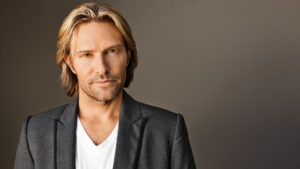
If you attended one of the LA Master Chorale concerts in June 2017, you might have heard I Fall. This was the first look anyone had at The Sacred Veil.
Whitacre, who is an artist-in-residence with the LA Master Chorale, is a Grammy Award-winning composer. He is perhaps best known for his virtual choir projects he assembles using videos submitted to him of people from around the world singing parts of his compositions.
On February 5th, while he was driving to a rehearsal (he will also be conducting the premiere performances), Whitacre and I talked about the work, his personal experience with loss and whether or not death can be looked upon as a friend.
When you receive the kind of acclaim you did for You Rise, I Fall, what pressure does that put on you to live up to the expectations set out by that first introduction to The Sacred Veil?
I’ll tell you, it wasn’t so much about the response to You Rise – which surprised me. I wasn’t really prepared for the reaction to it. But the pressure is much bigger in writing for Tony, the poet. We are really dealing with some incredibly intimate stuff and I so desperately wanted to get it right for him.
What is there about Silvestri’s writing that lends itself to music?
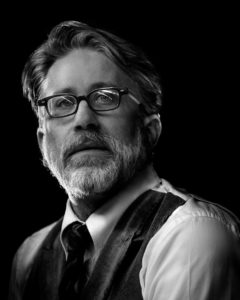
Tony’s poetry is pregnant with music. It’s kind of bubbling. And he knows me really well. When he writes for me he throws me all these softballs that are right in my wheelhouse – phrases that are singable and a single breath long. It’s kind of a dream collaboration.
If his poetry is that “pregnant” with music, what can your music add to it?
It’s not necessarily music in there, but the possibility of music. Just the way the words roll off the tongue suggest music. For me everything is about the architecture on the smallest and biggest level. I prefer it when the poet has done a lot of heavy lifting and built a deep structure.
As recently as January 29th you were commenting on your Twitter account that you were putting the finishing touches on The Sacred Veil. Are you ever fully done with a composition?
I’m still putting finishing touches on it. I’m really writing. At tonight’s rehearsal there will be two huge changes and I will keep making changes until the moment everybody rebels. Then I’ll make changes between the Saturday and Sunday performances. Then I’ll go through the score with a red pen after the performances and this will continue until I have something else to do. I don’t know if it is healthy or not, but I want to get every detail right.
When you are writing music that tackles loss, as this piece does, how much do your own experiences with loss inform what you write?
It’s an interesting question because I really have very little experience with loss. I lost my grandmothers and grandfather and that’s kind of it. Weirdly I think very little of my own experience. I like to think of myself as an empathetic person, so somehow I can feel other people’s sorrow. I don’t know actually. I’ve never thought about this. I wonder how it will be informed when I do experience loss.
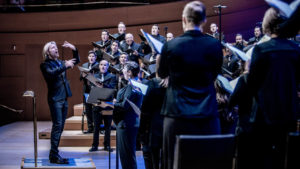
the LA Master Chorale
You’ve referenced the influence Mozart’s Requiem has had on you and the LA Master Chorale had great success with Lagrime di San Pietro. Why does the human voice express, perhaps better than any other instrument, the sense of loss and grief?
I suppose it is because the human voice is the most fundamental human thing we can do. A group of people coming together and singing, it’s foundational to who we are as a society. I feel like the human voice is able to communicate terabytes of information in ways that other instruments just can’t. Every time I think about writing a piece of music that is about birth or death or loss or love or all these fundamental human experiences, then I immediately go to the voice.
The poet Rainer Maria Rilke wrote, “Death is our friend precisely because it brings us into absolute and passionate presence with all that is here, that is natural, that is love.” Do you think death is our friend?
Like we talked before, I don’t have that much personal experience with death. I’ll tell you where the answer is in this. The words I set to music aren’t only Tony’s, three of the pieces are Julie’s. I’m setting her words, too. One of the things she wrote is talking about Christmas and she’s with the kids and that knowing this could be your last Christmas makes it sweet. You truly appreciate the children, the smells, the colors. And she writes about this focus and this wonderment that is in her life because she’s so close to death. I think that’s really true.
All photos courtesy of the Los Angeles Master Chorale


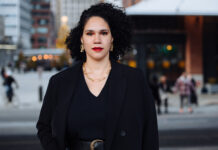



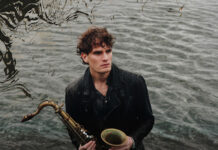
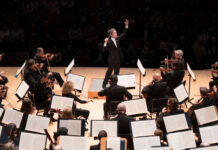



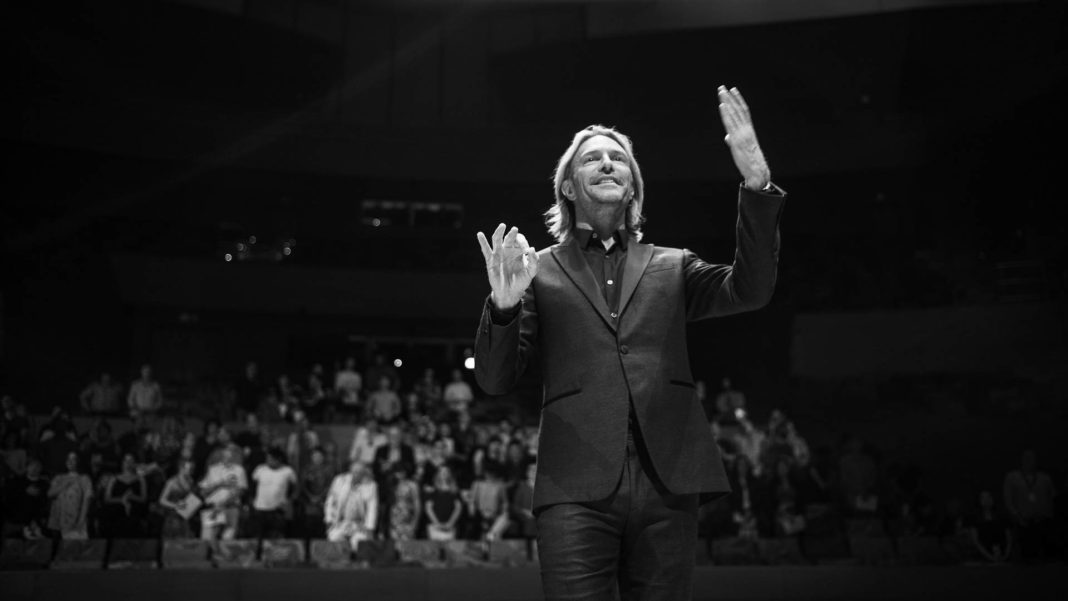
Lovely interview with my favorite modern composer
I heard this yesterday at Disney Hall and can saw that it was the most cathartic experience ever. And NO one in the area around us was dry-eyed. Fabulous. Evocative. And tribute to two great minds, and a beautiful soul.
Just came from the concert. What Eric Whitcare did is just indescribable. He’s keeps pushing the scale of what can be done with choral music and with The Sacred Veil he is musically and emotionally on a level of genius like no other composer, ever.
A transcendent choral encounter wedding poetry, performance, and emotion into an ethereal tapestry of sound. A mystical exploration into the process of grief…and grieving.